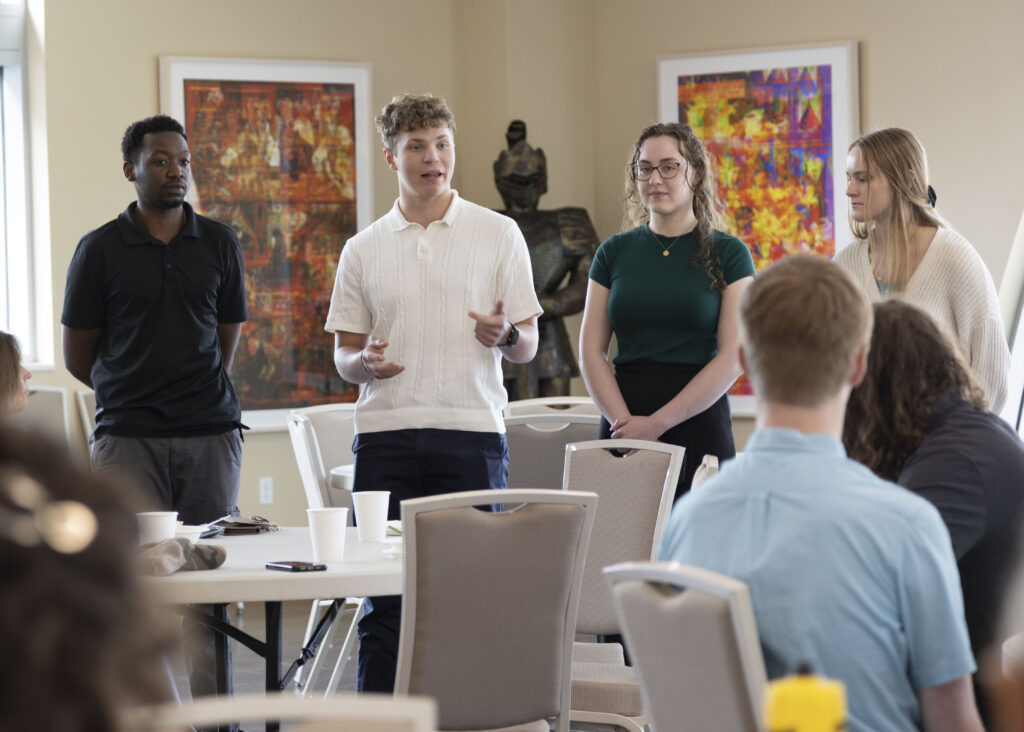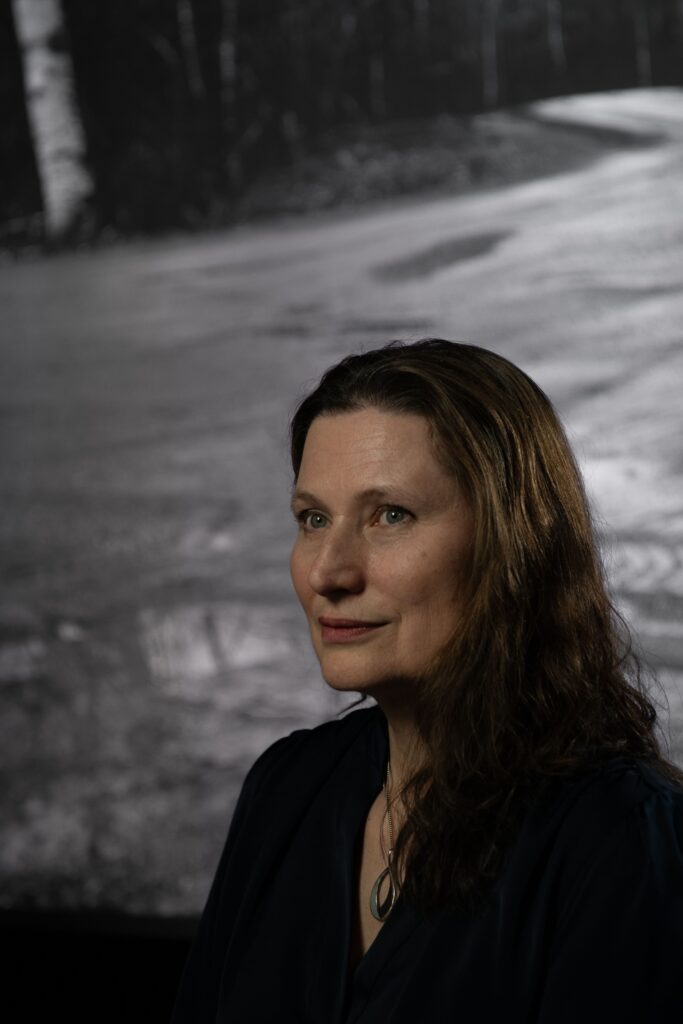Guenther makes case against solitary confinement

Lisa Guenther (photo above) delivers the annual Sutherland Lecture in the Dion Family Student Center Roy Room Wednesday afternoon. In the photo below left, Dean Jeffrey Trumbower introduces the speaker. (photos by Danielle Joubert ’20)
How often do the non-incarcerated think about what goes on behind prison walls? Students and faculty members were called to do just that at the annual Sutherland Lecture on Wednesday afternoon by guest speaker Lisa Guenther, entitled “The Living Death of Solitary Confinement and the Power of Collective Resistance.”
The lecture offered unique insights into the implications of solitary confinement viewed through the lens of phenomenology — the philosophical field examining and questioning human experience, sensation, and consciousness. Battling solitary confinement, Guenther asserted with specific cases and precise arguments, will require “collectively dismantling the structures of social death wherever we might find them and creating new structures of social life.”
Guenther is a Queen’s National Scholar in Political Philosophy and Critical Prison Studies at Queen’s University of Kingston, Ontario. Her publications include Solitary Confinement: Social Death and its Afterlives and The Gift of the Other: Levinas and the Politics of Reproduction. More recently, she authored the articles “On Pain of Death: The ‘grotesque sovereignty’ of the U.S. death penalty” and “A Critical Phenomenology of Solidarity and Resistance in the 2013 California Prison Hunger Strikes.” Currently, she’s working on a book examining incarceration, reproductive politics, and settler colonialism in Canada. She was introduced by Jeffrey Trumbower, dean of Saint Michael’s College.
She started by laying out the facts of the matter: Solitary confinement is an everyday reality of the United States prison system. It’s widely seen as a humane form of punishment for rules infractions behind bars or as a better alternative to capital punishment. Right now, more than 80,000 prisoners in the US are being held in isolation. There are 53 in the state of Vermont. As Guenther explained, the effects of this isolation on a person’s psychology, sensation, and concept of self are devastating and often permanent. 70 percent to 90 percent of survivors suffer from long-term symptoms including illusions and hallucinations, hypersensitivity to stimuli, panic attacks, paranoia, and general cognitive difficulties.
“A prisoner may enter the box with good hearing, 20/20 eyesight, and stable mental health,” Guenther said, “but the longer they’re in isolation, the greater chance that their sensory awareness, cognitive clarity, and emotional stability will erode.”
Guenther suggested that without the lens of phenomenology, we may not realize how heavily these things rely on the presence of others until that presence is denied to us. Even a prisoner’s most basic perceptions of three-dimensional objects can be disrupted. “The ‘there’ of what would otherwise anchor their experience of the world from ‘here’ has been pulled up, casting them adrift without a clear view of the horizon,” she said.
As it happens, that casting adrift during solitary confinement can undermine one’s very experience of existing in reality. “Survivors suggest that the experience of prolonged isolation is also an unraveling of experience,” Guenther said. “A deterioration of the senses, a loss of identity, a becoming invisible even to the point of annihilation.” She explained how our most basic perceptions don’t exist in a vacuum, but are affirmed and shaped through our interactions with the perspectives of others. “A good deal of what we take to be our own intrinsic properties are, in fact, social practices,” she said, explaining that conceptual elements of reality like the passage of time can be shattered when they’re no longer being affirmed by outside reality. The results are harrowing.
Just ask Omar Malik. Or Shane Bauer. Or Robert King. Essential to the ethos of Guenther’s lecture was bringing real “lived experiences” to light, often in the words of the people who went through them. When it came to describing the emotions and visceral sensations of being held in solitary confinement, she shared direct accounts from survivors such as these in reverence for the power of their own words.
To Guenther, seeking out the perspectives of others is necessary to dismantle the colonial structures behind solitary confinement and our prison system at large. In prisons, gated communities, and colonial society, she argues, there is an artificial separation between classes of people deemed to be worth protecting and those who must be protected against. This separation is an extension of the colonial structure of oppression.
Louisiana State Penitentiary, for instance, famous for three victims of solitary confinement known as the “Angola Three,” was a former slave plantation. 1 in 111 white women will go to prison in their lifetimes compared to 1 in 3 black men. Wednesday’s lecture traced this back to a colonial “othering” of black men (and other marginalized groups with disproportionate incarceration rates) that can create an experience similar to non-existence.
Critical phenomenology, Guenther emphasized, calls for us to seriously question the most basic assumptions through which our experiences our filtered. It’s a philosophy not about passive contemplation, but taking action. In this case, radical change must go “beyond the collective action of decolonization” and extend to a “decolonization of the mind.” For a full human experience, we must root our perspectives in the perspectives that oppressive structures try to erase, she said.






